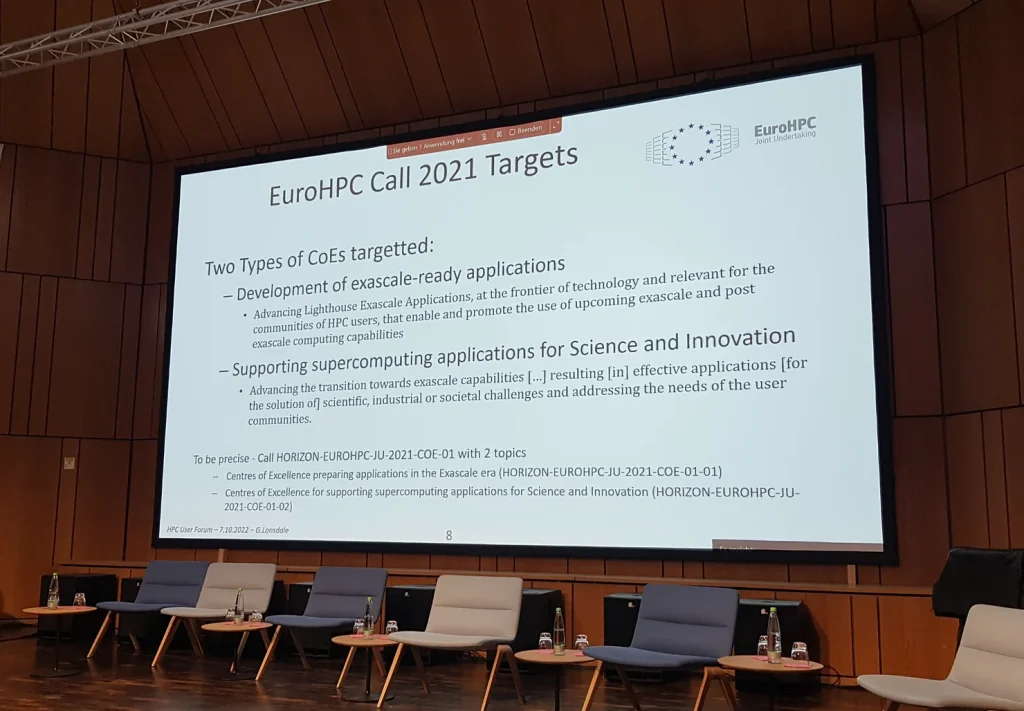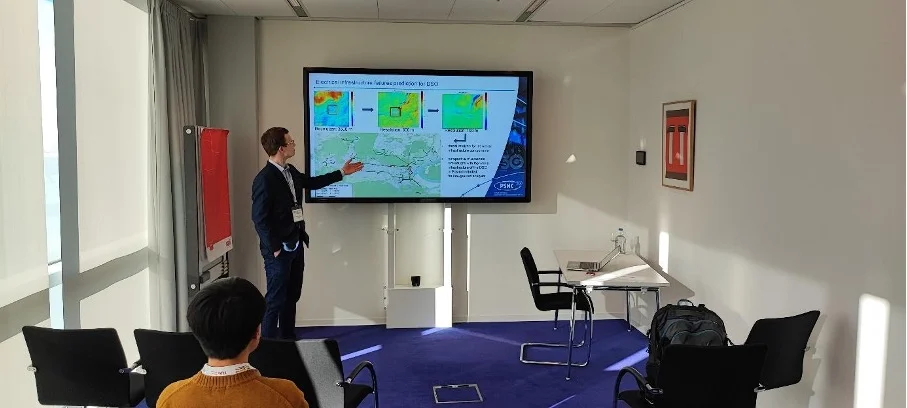In the upcoming joint workshop of HiDALGO2 and ESiWACE3, “Towards reliable Digital Twin: advancing applications and tools capabilities for Global Challenges” on 17/01/2024 at the HiPEAC conference, there will be four segments covering application, performance, uncertainty quantification, and portal, which in turn will be demonstrated in 7 sessions. You can see below the analytical information for each session and segment.

APPLICATION
The application section introduces the HiDALGO2 Urban Air Project, emphasising high-resolution urban wind comfort and air quality simulations.
Session 1
Title: Real-time digital twins for high-resolution urban air quality and wind comfort
Presenter: Zoltán Horváth (SZE)
Description: In this talk, the HiDALGO2 Urban Air Project (UAP) application will be introduced that provides a tool for high-resolution urban wind comfort and air quality simulations. Besides presenting the underlying in-house CFD-solver RedSim that is genuinely designed for multiple GPU and MPI+GPU systems, its physical model-based model order reduction module is also introduced. With a sensor data assimilation method, a real-time digital twin for the urban wind comfort and air quality will be presented as well.
Duration: 30 min
PERFORMANCE
The performance section showcases improvements in Python-based applications on modern hardware and lossy compression tools for weather and climate data.
Session 2
Title: Profiling and optimization of Python-based scientific applications in new HPC Systems.
Presenters: Łukasz Szustak, Marcin Lawenda (Poznan Supercomputing and Networking Center)
Description: This session outlines an adaptation methodology for two Python-based large-scale social sciences applications to modern HPC systems, including vendors of traditional x86-64 and ARM-based CPUs. This training investigates reducing performance bottlenecks and overcoming memory limitations to improve overall performance. In particular, the proposed methodology is based on HPC resources, where we strive for trade-offs and correlations between application and hardware.
Duration: 30 min
Session 3
Title: How to tackle the improvement of computational performance? Different possible ways explored in ESiWACE3
Presenter: Xavier Yepes-Arbós (Barcelona Supercomputing Center)
Description: Future weather and climate models will have to efficiently use exascale machines. This requires designing and implementing highly scalable, portable codes, capable of running on heterogeneous machines. Not all research teams have the resources or expertise to profile and optimise their models. In addition, profiling and optimisation is a cyclic process that might be slow and difficult to understand where bottlenecks are and their cause. However, there are different ways this process can be tackled, and some of them are explored and further improved in ESiWACE3, which is the 3rd phase of the Centre of Excellence in Simulation of Weather and Climate in Europe. These possible paths in ESiWACE3 include using existing tools, developing own tools, providing HPC expertise, and training courses for scientists. In particular, we will present different research lines that are aligned with these paths: research on using and evaluating lossy compression tools for weather and climate data; development of a workflow to automate the profiling of codes to speed up the profiling and optimisation cycle; and how in ESiWACE3 we provide HPC services to the community by opening calls for proposals.
Duration: 30 min
UNCERTAINTY QUANTIFICATION
The uncertainty quantification segment delves into how Centers of Excellence (CoEs) can apply uncertainty quantification and sensitivity analysis in their applications.
Session 4
Title: Uncertainty quantification and sensitivity analysis for CoEs
Presenters: Bartosz Bosak, Michał Kulczewski, Wojciech Szeliga (Poznan Supercomputing and Networking Center)
Description: This training aims to present how different CoEs can apply uncertainty quantification (UQ) and sensitivity analysis (SA) to their applications. This will start with UQSA basics. It will be followed by the presentation of a tool dedicated to uncertainty quantification. We will demonstrate how to use it and how to apply the analysis to different applications. We will present how this tool is adapted to the HPC environment and how it was integrated within QCG-Portal to automate running all ensembles and performing the analysis. The demonstrations will be showcased based on the Renewable Energy Sources (RES) application, one of the HIDALGO2 use cases.
Duration: 30 min
Session 5
Title: Uncertainty Quantification in HiDALGO2: Enhancing Modelling Credibility for Environmental Pilots
Presenter’s name: Flavio Cesar Cunha Galeazzo (High Performance Computing Center Stuttgart), László Környei (SZE)
Description: In this training, we delve into the crucial aspect of uncertainty quantification (UQ) within the HiDALGO2 project, specifically focusing on its application to environmental challenges that require computational fluid dynamics (CFD) simulations. We need to address the pressing question of how well our modelling and simulations perform by openly discussing the assumptions, approximations, and limitations that impact the credibility of our simulations. Here, UQ serves as the process to evaluate the influence of uncertainties in model inputs on computational results. To achieve statistically significant outcomes, UQ studies require a significant number of simulations, a challenge we aim to overcome using novel techniques such as surrogate modelling. We explore the integration of these UQ techniques into CFD simulations. Our ultimate goal is to enhance the overall runtime of these simulations by optimizing surrogate modelling techniques, striving for more accurate and reliable results.
Duration: 30 min
PORTAL
The final part focuses on simplifying HPC cluster access through portal solutions, demonstrating customization options for various applications via templates and custom views.
Session 6
Title: Unleashing the potential of HPC with QCG-Portal: building customised platforms for specific scientific and industrial use-cases.
Presenters: Piotr Kopta, Bartosz Bosak, Tomasz Piontek (Poznan Supercomputing and Networking Center)
Description: Getting easy access to HPC resources is a common problem faced by a multitude of scientists and engineers. The barrier to accessing the HPC power may be seen as too high for many domain experts to decide to cross it altogether. And those who decide to do so, often need to invest an enormous amount of time to get familiar with command-line tools or to accept the usage of poorly ergonomic interfaces that are far from their actual needs. It causes multi-level inefficiencies and distracts scientists or engineers from their domain work. During this workshop we will present QCG-Portal, being both a user-friendly and highly customisable graphical web interface for accessing HPC systems. The discussed topics will cover the usage of QCG-Portal from an end-user perspective. We will also show how the portal can be customised for different types of applications using templates and custom application views. Finally, we will briefly outline to HPC centre representatives and system administrators the procedures and options for the deployment of the QCG system.
Duration: 30 min
Session 7
Title: Web-based portal and visualization for EuroHPC applications – introduction and tutorial
Presenters: Ákos Kovács (SZE), Mátyás Y. Constans (SZE)
Description: In HiDALGO2 we have developed a portal, a tool that orchestrates the configuration, deployment, execution, monitoring, and post-processing of an application running on EuroHPC machines. For post-processing, and even for an online, interactive, real-time visualization of EuroHPC applications, a visualization tool has been developed. In this slot, we introduce the portal and the visualization tools, demonstrate their performance on EuroHPC platforms for the urban air pollution application, and provide a tutorial for participants.
Duration: 30 min
The workshop will take place on 17/01/2024, 14:00-17:30 in the room designated as “Seminar- raum 2” (with tables), located in the Leibniz Rechenzentrum (LRZ), a 3-5 minutes walk from the main conference venue of HiPEAC in Munich.



